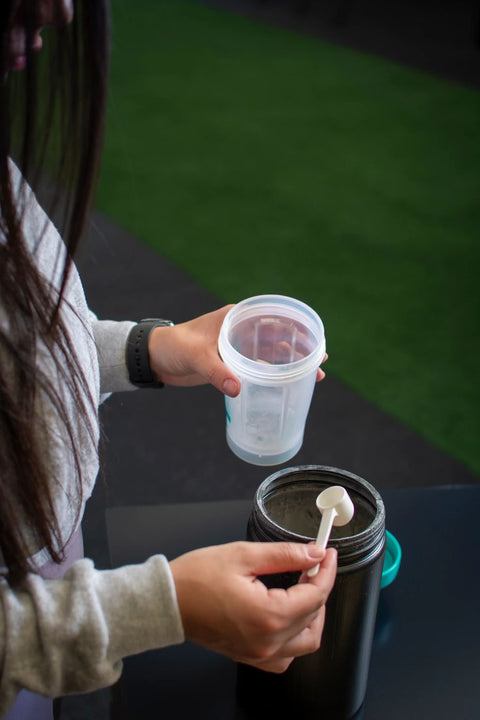Fat loss can feel complicated, with conflicting advice everywhere you look. But here's the truth: the fundamentals are straightforward, and the right supplements can genuinely support your efforts. Let's cut through the noise and look at what actually works, backed by research and real-world results.
The Foundation: It Starts with Nutrition
Before we dive into supplements, let's be clear: no supplement can overcome poor nutrition or lack of training. Fat loss fundamentally comes down to being in a calorie deficit while maintaining adequate protein and training to preserve muscle mass.
That said, quality supplements can make the process significantly easier, help you maintain performance while dieting, and support better results. They're tools that work alongside your efforts, not magic pills that work instead of them.
Protein Powder: Your Fat Loss Ally
If you're serious about fat loss, protein powder isn't optional, it's essential. Here's why:
High Satiety: Protein keeps you fuller for longer than carbs or fats. A protein shake can satisfy hunger and help you stick to your calorie targets without feeling deprived.
Muscle Preservation: When you're in a calorie deficit, your body can break down muscle for energy. Adequate protein intake (1.8-2.4g per kg of bodyweight during fat loss) helps preserve that hard-earned muscle while you lose fat. Protein powder makes hitting these higher targets practical and affordable.
Thermogenic Effect: Protein has the highest thermic effect of all macronutrients, meaning your body burns more calories digesting it compared to carbs or fats.
Convenience: When you're busy and hungry, protein powder prevents you from making poor food choices. It's a quick, controlled, high-quality protein source that fits your calorie budget.
Which Type: Whey isolate is excellent during fat loss due to its high protein content and low carb/fat content. Casein works brilliantly before bed or between meals due to its slow digestion, keeping you satisfied for hours. Many people use both strategically.
Caffeine: The Performance Supporter
Caffeine is one of the few supplements with solid research supporting its role in fat loss. It's found in coffee, tea, and pre-workout supplements.
The Benefits:
- Supports energy levels when you're in a calorie deficit and feeling low
- Research shows caffeine can support metabolic rate slightly
- Reduces perceived exertion, making training feel easier when you're dieting
- Supports focus and alertness when energy is naturally lower
How to Use It: Rather than relying on expensive "fat burner" supplements that are primarily caffeine anyway, get your caffeine from coffee or a quality pre-workout. Timing it before training maximises the performance benefits.
The Reality Check: Caffeine's effect on fat loss is modest. Its real value is helping you train hard and stay active when you're in a deficit and feeling tired.
Green Tea Extract: The Metabolism Supporter
Green tea extract, particularly the compound EGCG, has research supporting its potential role in fat loss.
What the Research Shows: Studies suggest green tea extract may support metabolic rate and fat oxidation, though effects are modest. Combined with caffeine, the effects appear to be more pronounced.
Practical Application: If you enjoy green tea, drinking several cups daily provides these compounds naturally. Green tea extract supplements offer a more concentrated dose. Look for products standardised to EGCG content.
Realistic Expectations: Green tea extract isn't going to melt fat away, but as part of a comprehensive approach, it offers legitimate support backed by research.
Omega-3 Fish Oil: The Health Preserver
While fish oil isn't a "fat loss supplement" per se, it's crucial during a fat loss phase.
Why It Matters: Calorie deficits can increase inflammation and stress on your body. Omega-3s support inflammation management, joint health, and overall recovery. They help you feel better and train harder during a demanding fat loss phase.
The Research: Some studies suggest omega-3s may support body composition improvements, though they're more valuable for the overall health support they provide during the stress of dieting.
Creatine: Keep Taking It
Many people mistakenly stop taking creatine during fat loss, worried about water retention. This is a mistake.
Why to Continue: Creatine helps you maintain strength and performance in the gym during a calorie deficit. This is crucial for preserving muscle mass. The slight water retention is intracellular (inside muscle cells) and doesn't affect how you look.
Performance Preservation: When you're dieting, maintaining training intensity is challenging. Creatine helps you continue training hard, which signals your body to preserve muscle rather than break it down for energy.
L-Carnitine: The Fat Transport Supporter
L-carnitine has research supporting its role in fat metabolism, particularly when combined with exercise.
How It Works: L-carnitine helps transport fatty acids into mitochondria where they can be burned for energy. Some research suggests it may support fat loss when combined with training.
The Evidence: While not as robust as some other supplements, several studies show potential benefits, particularly for people with lower baseline carnitine levels (like vegetarians).
Dosing: Research typically uses 1-2g daily. It's often included in quality pre-workouts or can be taken separately.
What About "Fat Burners"?
Let's address the elephant in the room. The supplement market is flooded with fat burners promising rapid results. Here's the honest truth:
Most fat burners are primarily caffeine with various other ingredients that have minimal research support. They're expensive versions of what you can get from coffee and a quality diet.
The Few That Work: The ingredients with legitimate research (caffeine, green tea extract, potentially L-carnitine) can support fat loss, but their effects are modest. They're not magic bullets.
The Reality: If you're eating properly, training consistently, and getting adequate sleep, a fat burner might give you a small additional boost. If you're not doing those things, no fat burner will save you.
Appetite Management: The Unsung Hero
One of the biggest challenges during fat loss is managing hunger. Some supplements can help:
Fibre Supplements: Glucomannan and psyllium husk can increase satiety and help you feel fuller. They're inexpensive and have some research support.
Casein Protein: As mentioned, casein's slow digestion makes it excellent for appetite management, particularly before bed or during long gaps between meals.
Electrolytes: Sometimes what feels like hunger is actually dehydration. Proper hydration and electrolyte balance can help manage appetite.
The Smart Fat Loss Supplement Stack
Here's a realistic, evidence-based approach:
Essential Tier:
- Whey/Casein Protein: For hitting protein targets and managing hunger
- Creatine Monohydrate: For maintaining performance and muscle
- Omega-3 Fish Oil: For health support during dieting stress
Valuable Additions:
- Caffeine (via coffee or pre-workout): For energy and performance
- Green Tea Extract: For modest metabolic support
- Multivitamin: Nutritional insurance when calories are restricted
Optional Support:
- L-Carnitine: Potential additional fat loss support
- Fibre Supplement: Appetite management help
- Electrolytes: Training performance and hydration support
What Matters Most
Supplements support fat loss, but they don't drive it. Your results come from:
Consistent Calorie Deficit: You need to be in a controlled deficit. Not too aggressive (which loses muscle), not too small (which takes forever).
High Protein Intake: Protein preserves muscle, manages hunger, and supports recovery. Aim for 1.8-2.4g per kg bodyweight.
Resistance Training: Lifting weights signals your body to keep muscle while losing fat. It's non-negotiable for quality fat loss.
Adequate Sleep: Poor sleep sabotages fat loss through increased hunger, reduced willpower, and hormonal disruption.
Patience and Consistency: Sustainable fat loss is roughly 0.5-1% of bodyweight per week. Faster often means muscle loss.
Supplements make these fundamentals easier to maintain and help you get better results, but they can't replace them.
The Realistic Timeline
With proper nutrition, training, and supplement support, you can expect:
- Noticeable changes in 4-6 weeks
- Significant changes in 8-12 weeks
- Transformation results in 3-6 months
Supplements don't dramatically accelerate this, but they help you maintain performance, preserve muscle, manage hunger, and feel better throughout the process.
Avoiding Common Mistakes
Don't: Rely on fat burners while ignoring nutrition and training
Do: Use proven supplements to support solid fundamentals
Don't: Cut calories too aggressively to speed things up
Do: Use protein powder to hit targets in a moderate deficit
Don't: Stop creatine because of water retention fears
Do: Continue creatine to maintain strength and muscle
Don't: Expect supplements to do the work for you
Do: Use them as tools that make your efforts more effective
The Bottom Line
Fat loss supplements won't melt fat off your body, but quality supplements genuinely support your efforts when used correctly. Protein powder helps you hit targets and manage hunger. Creatine maintains your strength. Caffeine keeps your energy up. Omega-3s support your health during the stress of dieting.
These aren't miracle workers, they're practical tools that make the challenging work of fat loss more manageable and effective. Combined with proper nutrition, consistent training, and adequate recovery, they help you achieve better results while feeling and performing better throughout the process.
The ultimate fat loss guide isn't about finding a magic supplement. It's about building sustainable habits, using proven tools to support those habits, and staying consistent long enough to see real results. Supplements are part of that equation, but they work best when everything else is in place.
Choose quality supplements that support your specific challenges (hunger, energy, performance, recovery), use them consistently, and stay patient. That's how you achieve lasting fat loss results that you can maintain long-term.






